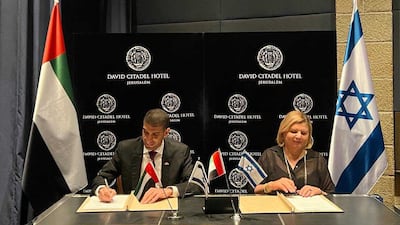The UAE and Israel have concluded talks on a Comprehensive Economic Partnership Agreement that is expected to boost non-oil trade and investment between the two countries.
The agreement is ready for signing and paves the way for a "new era of collaboration" in priority sectors such as agri-tech, med-tech, new energy energy solutions and advanced technology, Thani Al Zeyoudi, the UAE Minister of State for Foreign Trade, tweeted on Friday.
"This milestone deal will build on the historic Abraham Accords and cement one of the world’s most important and promising emerging trading relationships," he said.
The Cepa talks come after the UAE and Israel normalised relations in September 2020, which led to dozens of initial agreements in sectors from aviation to shipping. Israel and the UAE began negotiations for a trade and economic co-operation deal in November 2021, a couple of months after the Emirates launched similar discussions with India.
The UAE signed a similar agreement in February with India, Asia’s third-largest economy, that is expected to boost non-oil trade between the two nations to $100 billion in five years, from $60bn currently.
The UAE-Israel Cepa will "substantially reduce or remove" tariffs on a wide range of goods, boost market access for services, promote investment flows, create jobs and promote new skills. It will also enhance climate action, deepen co-operation on strategic projects and facilitate expansion of the small-and-medium enterprises sector, the UAE Ministry of Economy said in a statement on Friday.
A high-level UAE delegation travelled to Israel this week to conclude talks on the Cepa and, after the final round of negotiations, the agreed text is now being finalised ahead of an expected formal signing between the nations’ respective leaders in the "coming weeks", according to the ministry.
The deal comes at an important time as the world emerges from pandemic and faces new challenges, which requires "multilateral approaches" to rebuild supply chains, stimulate economies and restore trust in the global system, Mr Al Zeyoudi said in the statement.
"We are confident that this deal will not only boost trade but increase investment, boost tourism, accelerate digital advances and promote collaboration in priority sectors such as energy, education, healthcare, food security, entrepreneurship, cybersecurity and advanced technology," he said.
The UAE-Israel Cepa has the potential to propel Israel on to the list of the UAE’s top 10 trading partners and will significantly boost trade and investments between the two countries, Hamad Buamim, president and chief executive of Dubai Chambers, told The National on March 1.
Trade between the countries reached $700 million within a year of the major agreement as they expanded co-operation in sectors such as finance and energy.
The UAE and Israel on Sunday also signed a memorandum of understanding to boost up co-operation in the field of maritime transport, to facilitate exchange of experiences and to strengthen strategic partnerships to serve common interests, further expanding their ties.
The agreement — Suhail Al Mazrouei, the UAE's Minister of Energy and Infrastructure, and Merav Michael, Israel’s Minister of Transport and Road Security — aims to enhance co-operation between the two countries in the field of transport, especially maritime, and to set a road map for future work, the statement said.
The pact also aims to make use of the maritime fleet and ports of both countries, ensure safety of ships, crew, cargo and passengers, enhance the protection of the marine environment and develop maritime trade, the ministry said.
The agreement will also help anticipate the UAE and Israel’s future challenges in the field of transportation through joint studies and research.
The UAE plans to sign eight Cepa deals this year and 27 overall, Abdulla bin Touq, UAE Minister of Economy, said this week at the Annual Investment Meeting in Dubai.
"If we want to double our economy from Dh1.4 trillion ($381bn) to Dh3 trillion in seven years that we have announced, we have to average a growth of about 5 per cent to 6 per cent," the minister said on the sidelines of the event on Monday. "I’m hoping for that target to happen this year."
The UAE is working to strengthen relations with key trading partners. It is currently in Cepa negotiations with Indonesia, the biggest economy in South-East Asia.
A similar deal is being negotiated with South Korea, which is expected to be finalised by the end of 2022. The agreement with South Korea aims to enhance the economic partnership between the two countries to a minimum of $20bn in the next three to five years.
"The UAE is moving quickly to strengthen ties with Africa, Asia and South America," the Ministry of Economy said on Thursday.
The UAE, the Arab world’s second-biggest economy, has made a strong recovery from the coronavirus-induced economic slowdown and has maintained strong trade momentum despite pandemic-related uncertainties.
The Central Bank of the UAE estimates that the economy will grow 4.2 per cent in 2022, higher than a previous forecast of 3.8 per cent.
The UAE economy is expected to grow 4.9 per cent in 2022, according to Japan's largest lender, MUFG Bank, while Emirates NBD forecasts an expansion of 5.7 per cent and Abu Dhabi Commercial Bank estimates 5 per cent, supported by strong oil sector growth. Emirates NBD estimates the non-oil economy growing at 4 per cent, while ADCB forecasts 3.5 per cent growth.


